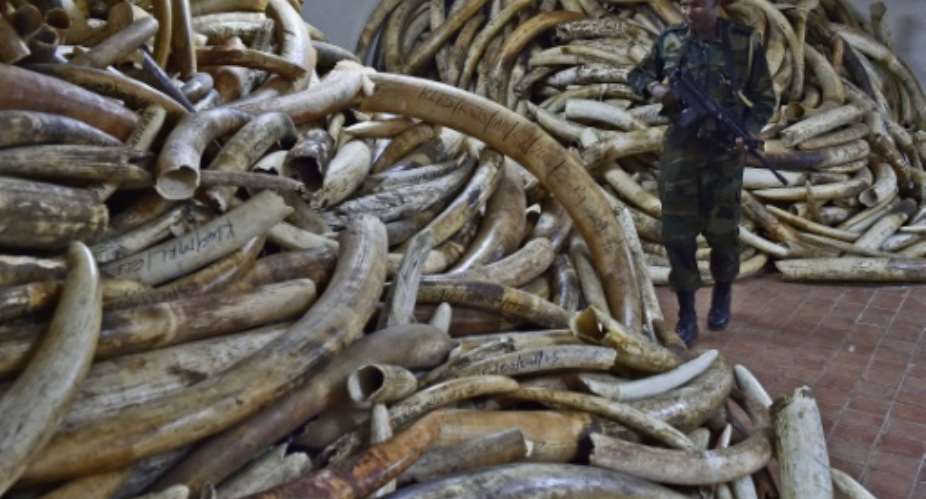Nairobi (AFP) - Kenya on Wednesday launched a three-week amnesty to hand in ivory and rhino horn ahead of the world's biggest burning of ivory next month.
The mass burning, the vast majority of its ivory and rhino horn stockpile, will amount to some 105 tonnes of ivory, seven times the size of any ivory stockpile destroyed so far, as well as 1.35 tonnes of rhino horn.
"Anybody holding any ivory, rhino horns or any other wildlife trophies or jewelry or trinkets made from these materials should surrender them," environment minister Judi Wakhungu told reporters, as preparations for the giant burning ceremony were launched in Nairobi national park.
"Those who take advantage of this amnesty will not be punished."
The highly publicised display on April 30 will be led by Kenyan President Uhuru Kenyatta and attended by a gaggle of celebrities, conservationists and heads of state.
Kenyatta set fire in March 2015 to a giant pile of 15 tonnes of elephant ivory, which conservationists said then was the largest ever burned in Africa.
At the time, the pile of tusks formed a dramatic three-metre (10-foot) tall pyre, which burned for several days until the ivory was reduced to ash.
"Although the destruction of ivory and rhino horn will not in itself put an end to the illegal trade in these items, it demonstrates Kenya's commitment to seeking a total global ban in the trade of ivory and rhino horn," Wakhungu added.
More than 30,000 elephants are killed for their ivory every year in Africa to satisfy demand in Asia where raw tusks sell for around $1,100 (1,000 euros) a kilogramme (2.2 pounds).
"The poaching of elephants and rhinos and illegal wildlife trade is a major problem across much of Africa, it threatens the very survival of these iconic species," Wakhungu said.
"Poaching is facilitated by international criminal syndicates and fuels corruption."





 Former Kotoko Player George Asare elected SRC President at PUG Law Faculty
Former Kotoko Player George Asare elected SRC President at PUG Law Faculty
 2024 elections: Consider ‘dumsor’ when casting your votes; NPP deserves less — P...
2024 elections: Consider ‘dumsor’ when casting your votes; NPP deserves less — P...
 You have no grounds to call Mahama incompetent; you’ve failed — Prof. Marfo blas...
You have no grounds to call Mahama incompetent; you’ve failed — Prof. Marfo blas...
 2024 elections: NPP creates better policies for people like us; we’ll vote for B...
2024 elections: NPP creates better policies for people like us; we’ll vote for B...
 Don’t exchange your life for wealth; a sparkle of fire can be your end — Gender ...
Don’t exchange your life for wealth; a sparkle of fire can be your end — Gender ...
 Ghana’s newly installed Poland train reportedly involved in accident while on a ...
Ghana’s newly installed Poland train reportedly involved in accident while on a ...
 Chieftaincy disputes: Government imposes 4pm to 7am curfew on Sampa township
Chieftaincy disputes: Government imposes 4pm to 7am curfew on Sampa township
 Franklin Cudjoe fumes at unaccountable wasteful executive living large at the ex...
Franklin Cudjoe fumes at unaccountable wasteful executive living large at the ex...
 I'll 'stoop too low' for votes; I'm never moved by your propaganda — Oquaye Jnr ...
I'll 'stoop too low' for votes; I'm never moved by your propaganda — Oquaye Jnr ...
 Kumasi Thermal Plant commissioning: I pray God opens the eyes of leaders who don...
Kumasi Thermal Plant commissioning: I pray God opens the eyes of leaders who don...
